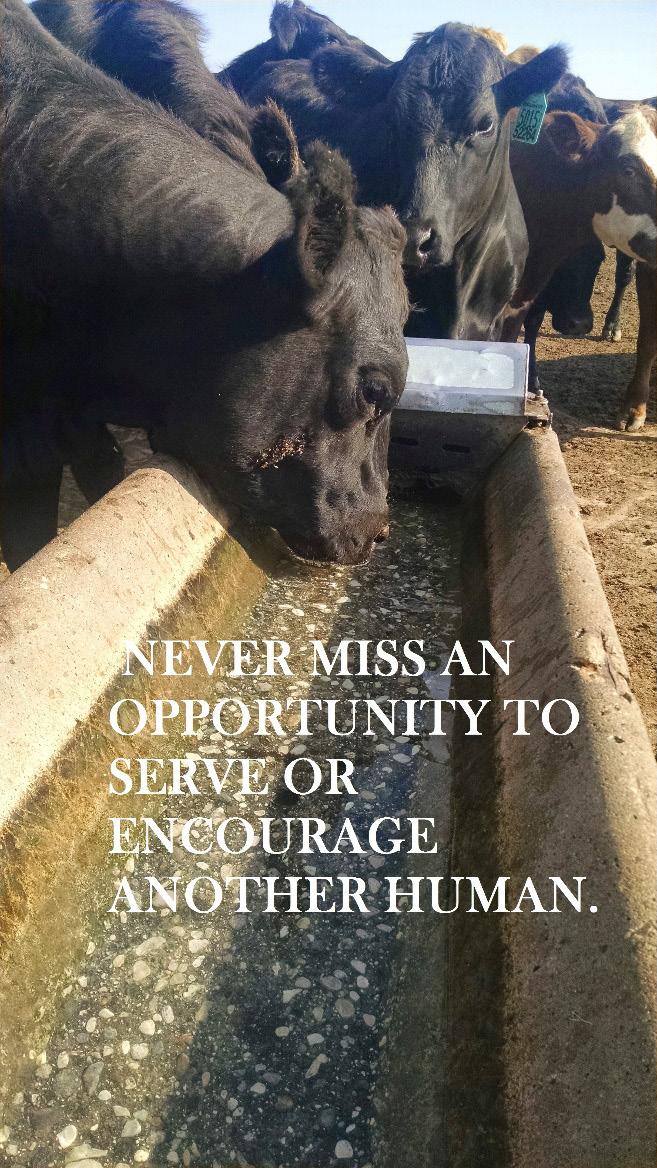
3 minute read
KRAs and Winning!
By: Dr. Nels Lindberg, Production Animal Consultation
As leaders, as feedyard manager, head cowboy, cattle foreman, or any crew leader, we can all reflect back on stories in which team members failed us. We can think about the time when cowboy Tanner just wouldn’t show up to work on time, and have his horse saddled by daylight to ride. Or when the feedtruck driver John just couldn’t consistently feed the full length of the bunk. Or when the feed crew is complaining about the cowboys leaving gates chained closed, or cowboys complaining about feed truck drivers opening up the gates. We all have failed many times in what we do, and we have all failed many times at leading a team to be highly successful.
Business Consultant and author Jim Collins, in his book Good to Great, says, “I put them on the bus, but I put them on the wrong seat on the bus.” We need to put them on the right seat on the bus. And that is our job to accomplish this.
As we think about the ways a team member can fail at their job; there are 3 main reasons this occurs. The #1 reason is leadership failure. The #2 reason is personal problems, #3 is incompetence. Many, many times, personnel failure at work is due to #1. And as proud leaders, we often don’t want to accept that or believe that.
So, #1, we must as leaders make sure we do all the things we can do for our team members to succeed. In order for our team members to succeed, we must tell them what it looks like for them to succeed at their job. In the last magazine we talked about Millennials and what they want, and feedback is very very important to them. And they also like frequent feedback, not just once a year feedback. But I believe that all people, regardless of generation likes feedback.
We all like to know how we are doing, we all want to please our “boss” each day. And if you feel like your people don’t want to please you, then you are likely failing as their leader.
So as leaders, we must develop and have KRAs, Key Results Areas, for each and every team member. We must sit down, think about each position we have, and each team member we have, and write KRAs. And another key factor is to have your team members write their own KRAs, and you then sit down together and edit and adjust them as you see fit.
As you think about KRAs, you may be asking what is the difference between a KRA and a job description? A KRA is focused on outputs of the job, whereas job descriptions are focused on the inputs. A description is we want you to ride pens each day and identify and pull sick cattle.
A KRA is you are responsible for the health and well-being of the animals in your pen and their health outcomes. So the difference is a small difference, but a big difference in what your team member may take away from it, and better understand what you want out of them.
So again, the big difference is, we want to focus on the outputs and not focus on the inputs. And the main reason is, as we first add any person to our team, we want them to know what our expected results are. This is the best way to develop a job description, and we want to keep it very simply and very clean.
We want it to be 3 or 4 key areas, and we want it ordered by what is most important to least important, although with just 3 or 4 key areas, they are all likely very important. We want all KRAs to be centered around what is expected, something or parts of it can be measured, and can be reported.
The number one goal of any KRA, is employees will understand with this KRA, what it looks like to win at our yard or our operation. As awesome, caring leaders, we want all of our team members to succeed, and we must do these things to help get them there.

Our people must know from their leader what the expectations are, what it looks like to win, and we must give them all the tools they need to win.
In the end, it comes down to people, not a number or numbers. We must treat all our people like people, we must treat them like we want to be treated, treat them with respect and ask them to do the things it takes to succeed. And if you don’t care about people, if you don’t care about your people’s lives and their success, then you don’t deserve to lead them.
The famous and one of the best leadership developers of all time, Zig Ziglar, said it best, “You must help your people get what they want out of life, so that you may get what you want out of life.” And if you do that, I promise, you won’t be able to hold back your success or your operation’s success. Go get it done!!










